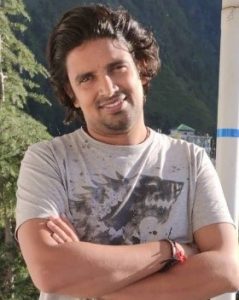
Pankaj Kumar Singh
TCSM Postdoctoral Researcher
Institute of Biomedicine
University of Turku
I was in Italy when the first case of COVID-19 appeared in China, but when things became more serious globally, I moved back to India. Suddenly Italy, the place that was like a second home to me, got wrecked by COVID, and slowly the whole world, including India, was taken over. So, the first thing everyone went looking for was a cure. COVID being a health-related problem, finding a cure meant discovering either a drug, a therapy, or something else able to stop the virus taking so many human lives. Everyone knows discovering a drug is a complicated and time-consuming process. What is not as widely known is that the central piece of any drug discovery puzzle is a medicinal chemist – a trained professional of medicinal chemistry. While discovering a drug requires hefty contributions from biologists (pharmacologists) and experts from other sciences, at the core are medicinal chemists, who provide the drug molecule on which everyone works.
Of the thousands of research papers published on COVID in the last 12-15 months, excepting a few papers reporting on the structures of different proteins of SARS-COV-2, the majority are on designing inhibitors for the reported proteins. The reason for this is, quite correctly, that the first step in a drug discovery process for any disease is the identification of lead molecules, which is usually the responsibility of a medicinal chemist. However, many of the authors were not medicinal chemist and probably did not have the training required to keep basic considerations in mind. As may be expected, most of these papers were published ‘for the sake of it’, or to benefit from a hot and current topic. In most of cases, the information provided is simply redundant and can never be utilized in a practical scenario. Only a handful of the published papers provide any significant outcome.
In fairness, I am not against interdisciplinary research or people shifting their field of research from one to another. What I do want to underline here is that people should be familiar with the intricacies of a field before starting their work, and there are only a limited number of people sufficiently trained in medicinal chemistry.
In a normal drug discovery process, it is said that around 10000 molecules enter clinical trials (i.e. validation for safe and efficacious use in humans), and out of those only 1-5 molecules come out as drugs, which are then formulated. Simply put, this means around 10000 medicinal chemists are needed to provide enough lead molecules for biologists and formulation scientists to develop a single drug. This clearly highlights a need for an increase in academic set-ups and the number of medicinal chemists trained. Serious attention on this field is required to improve our response to any kind of pandemic.
As things are, if you were to review the data of universities offering training in this field, you might be surprised to know that the offerings are very limited. It is important, here, to differentiate between an organic chemist or a bioinformatician, and a medicinal chemist. An organic chemists is an expert in synthesizing molecules, developing synthetic schemes, improving yields, developing shorter routes for synthesizing a product etc. An organic chemist is not, however, concerned with whether these products have any pharmacological use. Similarly, a bioinformatician focuses on developing and utilizing codes and programs to handle data of biological macromolecules, proteins and drugs etc., but is not usually familiar with the basic considerations required for going after a biological target, or for focusing on one class of molecules over another. A medicinal chemist is able to utilize computational experiments or knowledge-based conclusions to identify the most suitable molecule for further consideration. A medical chemist is also able to synthesize the specific molecule and to do initial screening to validate it as a lead, which could be further optimized on the basis of biological results. A medical chemist must understand biology, must be a data scientist, must be familiar with the full spectrum of assays and analyses that inform their design work.
There are valid reasons for the limited interest in this field. First and foremost, the harsh reality is that most of the time the hard work and financial investment do not bear fruit. A molecule may fail at one parameter out of hundreds, and everything goes down the drain. As mentioned above, the work of 10000 results in success for only a few. The rest must face failure and continue the hard work. Therefore it is tough to get the most basic thing needed for research, funding. Pharmaceutical companies feel that pursuing new drugs is a waste of money. Most companies prefer to stick to already approved drugs, with R&D only working to improve the formulation-based parameters of generic drugs. While recently academic drug discovery centers have grown across many campuses as companies realize the benefits of facilitating early-stage research at universities, there are rarely enough resources (proficient manpower and grants) available in an academic set-up to continue with preliminary but interesting findings. Therefore, these research groups are often only able to do enough to survive, not to grow.
When a health emergency like this pandemic comes, we want all hands on deck – even if most of them are not trained for this arena, because not many are interested, and those who are are not supported enough.
Pankaj Kumar Singh
TCSM Postdoctoral Researcher
Institute of Biomedicine
University of Turku

Why is it important for researchers to be familiar with the intricacies of a field before starting their work, particularly in fields like medicinal chemistry?
Greeting : Telkom University